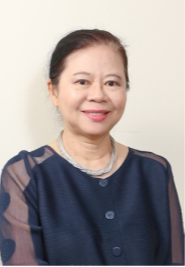Cohort 1 – 06/2020 – 05/2022
Dr. Rattima Sirihorachai
Mahidol University, Thailand
U.S. Mentor: Dr. Milisa Manojlovich
Thai Mentor: Dr. Yajai Sitthimongkol

Purpose of training:
In Thailand, where approximately 1.3 million major surgeries are performed every year, patient safety is a central focus. The Institute of Hospital Quality Improvement and Accreditation of Thailand (HA) has developed Thai patient safety goals and given them the acronym “SIMPLE”. Patient safety goals specific to the Operating Room (OR) context include S, the first goal of HA called S means safe surgery. Although Thai hospitals emphasize and implement standard guidelines for patient safety during surgical procedures, adverse events still occur. For example, the prevention of inadvertently retained instruments or surgical sponges by the surgical team in surgical patients is one of the 10 objectives for safe surgery. Retained surgical items (RSI) continue to occur despite prevention strategies recommended by healthcare safety organizations. There is a growing body of literature addressing the intervention strategies to prevent RSIs; however, the results continue to vary across studies. There is a need to identify effective interventions that prevent RSIs in order to improve outcomes. Developing the effectiveness intervention can provide a best practice to decrease adverse events in the operating room and be able to generalized and impact to policy change in OR all over Thailand.
Biography:
Dr. Sirihorachai holds a PhD in Nursing from the University of Michigan.
Dr. Thitipong Tankumpuan

Mahidol University, Thailand
U.S. Mentor: Dr. Lenette Jones
Thai Mentor: Dr. Yajai Sitthimongkol

Purpose of training:
Sexual dysfunction has been widely explored in western countries. More than a half of patients with heart failure reported the experience of sexual dysfunction. However, little is known about sexual dysfunction in patients with heart failure among Asian population. Asian culture believes that sex is a sensitive issue and a taboo subject according to culture and norm. In general population, the prevalence of sexual dysfunction in Asian found to be higher than Western population. Moreover, Asian with heart failure were younger and presented with higher functional class by the New York Heart Association than those of other continents. Therefore, sexual dysfunction become a significant issue that healthcare providers have to explore the influencing factors with sexual dysfunction and develop the intervention to address this problem to promote sexual function in patient with heart failure.
Biography:
Dr. Tankumpuan holds a PhD in Nursing from the Johns Hopkins University.
Cohort 2 – 06/2021 – 05/2023
Dr. Kusman Ibrahim

Universitas Padjadjaran, Indonesia
Indonesian Mentor: Dr. Yodi Christiani

Purpose of training:
The potential research aims to utilize and manage the available big data platform to support the development of a social media-based intervention model in improving the health outcomes of people living with HIV/acquired immunodeficiency syndrome (PLHA). The benefits of this study are to strengthen the data management information system of HIV/AIDS and related health issues, social media-based intervention for prevention and care of HIV, and finally to improve health outcomes of people living with HIV (PLWH). This study will employ a research and development method which emphasizes a process used to develop and validate a product. It consists of studying research findings, developing the product, field testing, revising until the product meets the objectives.
Biography:
Dr. Ibrahim holds a PhD in Nursing from the Prince of Songkla University, Thailand.
Dr. Andi Masyitha Irwan

Hasanuddin University, Indonesia
U.S. Mentor: Dr. Kathleen Potempa
Indonesian Mentor: Dr. Nugroho Abikusno

Purpose of training:
My research area focuses on hypertension self-care especially on low-salt diets to prevent and manage hypertension among older people living in the community. In 2014, we conducted a survey among Indonesian older people and we found that the number of respondents who never limit their sugar and salt intake was especially surprising. An intervention program should be developed to limit salt intake Indonesian elderly because it might bring risk of hypertension. Therefore, in the following year, my research team member and I examined the efficiency of self-care and efficacy intervention to reduce and maintain a low salt diet in the community setting. In those our randomized trials study, we found that hypertension and prehypertension older people who received self-care and efficacy intervention, showing decrease in their salt intake as a way to control their blood pressure. However, those previous studies only involved small sample size and in urban areas. Further studies with larger sample size, various settings and longer follow-up are required to determine the broader effect of this program.
Biography:
Dr. Irwan holds a PhD in Nursing from Kanazawa University, Japan.
Dr. Patcharee Jaigarun

Boromarajonani College of Nursing, Sanpasithiprasong, Thailand
U.S. Mentor: Dr. Sarah Stoddard
Thai Mentor: Professor Sawitri Assanangkornchai

Purpose of training:
The long-term goal of my research is to decrease the prevalence of alcohol consumption among those adolescents. My research interest is focused on alcohol consumption in minors, and alcohol prevention program among Thai adolescents. My proposal will develop digital school-based program to prevent alcohol consumption among Thai adolescents via this D43 training program. I hope this program will help and prevent adolescents’ alcohol use in Thailand.
Biography:
Dr. Jaigrun holds a PhD in Nursing from the University of Illinois at Chicago.
Dr. Kedsaraporn Kenbubpha

Boromarajonani College of Nursing, Sanpasithiprasong, Thailand
U.S. Mentors: Drs. Lynae Darbes, David Fresco
Thai Mentor: Dr. Chatchawan Silpakit
Purpose of training:
My training goals are to 1) enhance my theoretical approaches to the study of depression, 2) gain skills in developing the interventions to maximize reduction and prevention of recurrent depressive symptoms in people suffering from depression, and 3) build my evolving research program on depression. I believe the opportunity to be a fellow at UMICH will enhance my scholarship’s innovation and sophistication and prepare me to become a lead researcher in the field. Moreover, my research will increase access to the intervention, reduce and prevent recurrent depression in Thai people, and include people worldwide.
Career Development and Broad Impact of Fellowship
The postdoctoral fellowship would help me enhance my research skills in depression internationally at the postdoctoral level and advance my career. The seminars, courses, and academic participation in the School of Nursing at UMICH would enhance and broaden my training experiences by exposing me to new concepts, perspectives, and supplementary methods. These experiences would help me think critically about the connections among multiple determinants of depression and explore novel research questions in innovative ways.
Lastly, fellowship activities will prepare me to produce basic knowledge that will be used to guide intervention and policy efforts that promote and help people suffering from depression.
Biography:
Dr. Kenbubpha holds a PhD in Nursing from the The University of Newcastle, Australia.
Dr. Chinakorn Sujimongkol

Boromarajonani College of Nursing, Sanpasithiprasong, Thailand
U.S. Mentors: Drs. Ivo Dinov and Yi Li
Thai Mentor: Dr. Cholatip Pongskul

Purpose of training:
I propose to conduct a large-scale population-based study (big data analytics) of chronic kidney disease CKD patients in the Thai population. Because the ultimate goal of CKD management is to prevent renal disease onset or disease progression, therefore, I think that it is necessary to seek out new and high quality sources of information on potential confounding factors, especially in the growing concern with environmental related health problems. This will help to to foster improvement in preventive and protective therapies for kidney disease care.
Biography:
Dr. Sujimonkol holds a Doctor of Public Health (Dr. P.H.) from Khon Kaen University, Thailand.
Dr. I Gede Putu Darma Suyas

Mahidol University, Thailand
U.S. Mentors: Drs. Jan Larson and Laura Struble
Indonesian Mentor: Prof. Dr. dr. R A Tuty Kuswardhani

Purpose of training:
Currently, the risk factor scale of fall especially for older people living in the community is limited. Risk factor scale is essential to measure risk of falling. However, risk factor scale alone is not sufficient to better prevent fall. Further step is needed to develop a systematic approach to prevent fall among elderly by developing a clinical pathway based on the risk factor in the developed scale. This clinical pathway is the basic of self-care guideline to be used by older people and family to prevent falling at home. This current study is designed to develop and test :1) Risk factor scale of fall for older people living at home, and 2) A self-care guideline based on risk factor assessment to prevent fall for older people living at home. Five steps are essential: 1) Systematic literature review aimed to search and critically appraise literature around risk factor of fall among elderly living at home, 2) Development of risk factor scale, 3) Reliability and validity test of the scale, 4) Development of a self-care guideline based on risk factors in the developed scale, and 5) Evaluation of the self-care guideline.
Biography:
Dr. Suyasa holds a PhD in Nursing from the School of Nursing and Midwifery, Flinders University (South
Australia).
Cohort 3 – 06/2022 – 05/2024
Dr. Samoraphop Banharak

Assistant Professor
Faculty of Nursing, Khon Kaen University
U.S. Mentor: Dr. Kathleen Potempa
Thai Mentor: Prof. Dr. Panita Limpawattana
Lecturer of Medicine Department, Faculty of Medicine, Khon Kaen University

Purpose of training:
I want to research how to use telehealth, m-health, or e-health for promoting or disseminating information about CHD and elevating people’s health literacy. The results will be content development, mobile application creation, and intervention implementation using a randomized controlled trial (RCT) design. My research findings in this area should lead to interventions to modify people’s beliefs and knowledge about coronary heart disease and AMI that will create behavior change.
Biography:
Dr.Samoraphop Banharak earned his PhD in nursing in 2016, from Trudy Busch Valentine School of Nursing, Saint Louis University, Missouri, USA.
Dr. Surachai Chaniang

Lecturer of Mental Health and Psychiatry Nursing Department, Boromarajonani College of Nursing, Nakhon Phanom, Nakhon Phanom University, Thailand.
U.S. Mentor: Dr. Dr. Sarah A. Stoddard
Thai Mentor: Prof. Dr. Warunee Fongkaew
Distinguished professor of Faculty of Nursing, Thammasat
University

Purpose of training:
The long-term goal of my research is to reduce the risk factors, and to enhance the protective factors of adolescent suicide risk behavior who living in the remote area in Thailand. In the first phase, my research interest is focused on the situational analysis of adolescent suicide risk behaviors, by employing both qualitative and quantitative approaches. In the second phase, I will develop and evaluate the feasibility and acceptability of a school-based suicide prevention program for Thai adolescents based on the participation of all the key stakeholders. In the final phase, I will test the effectiveness of a school-based suicide prevention program for Thai adolescents.
Biography:
Dr. Surachai Chaniang holds a PhD in nursing (International Program) in 2018, from the Faculty of Nursing, Chiang Mai University, Thailand.
Dr. Choochart Wong-Anuchit

Assistant Professor of Psychiatric and Mental Health Nursing at Mahasarakham University Faculty of Nursing, Thailand
U.S. Mentor: Dr. Lynae Darbes
Thai Mentor: Dr. Darunee Rujkorakarn, Ed.D., R.N.
Associate Professor and Former (Founding) Dean
Mahasarakham University Faculty of Nursing, Thailand

Purpose of training:
Dr. Wong-Anuchit is a post-doctoral trainee (cohort 3) in the University of Michigan School of Nursing Expansion of NCD Research Capacity in Thailand with Outreach to Indonesia program. He plans to develop a healthy lifestyle modification intervention to motivate people with mental illness and substance use disorder to change their risky behaviors into healthy practice direction. For this post-doctoral program, he would like to conduct the research project entitled “Development and Feasibility Testing the Effects of Interventions based on the Acceptance and Commitment Therapy (ACT) on Internalized Stigma, Psychological Flexibility, and Recovery Capital of Youths with Substance Use Disorder (SUD).” This research project will be conducted to address the following specific aims:
Aim 1: To explore, using mixed method research design, the context about internalized stigma, psychological flexibility, and recovery capital of youths with SUD.
Aim 2: To identify potential avenues for developing/modifying interventions based on ACT to reduce internalized stigma and promote psychological flexibility and recovery capital of youths with SUD.
Aim 3: To test the feasibility (preliminary and pilot) in determining the effects of intervention developed/modified under theoretical framework of ACT on internalized stigma, psychological flexibility, and recovery capital of youths with SUD.
Biography:
Dr. Wong-Anuchit holds a PhD in Nursing from Saint Louis University (St. Louis, Missouri, USA). He is an Assistant Professor of Psychiatric and Mental Health Nursing at Mahasarakham University Faculty of Nursing, Thailand. His outside interests include traveling to new places and exploring new things.
Dr. Chontira Riangkam

Instructor, Department of Medical Nursing,
Faculty of Nursing, Mahidol University
U.S. Mentor: Dr. Kevin Joiner
Thai Mentor: Dr. Yajai Sitthimongkol
Associate Professor, Mahidol University

Purpose of Training:
A postdoctoral program will strengthen my research capacity in conducting interventional research using mobile phone-based technology to enhance glycemic control in adults with insulin-treated T2DM. This research will provide a new body of knowledge in nursing care regarding using mobile phone-based to provide DSMES in adults with insulin-treated T2DM to optimize diabetes self-management and glycemic control in Thailand. Additionally, my research capability will benefit nursing education programs for preparing undergrad and postgrad nursing students to adopt mobile phone technology to improve the effectiveness of nursing interventions in adults with T2DM and other NCDs.
Biography:
Dr. Chontira Riangkam received her BNS, MNS, and PhD degrees from Mahidol University.
Dr. Rian Adi Pamungkas

Lecturer, Esa Unggul University Jakarta
U.S. Mentor: Dr. Kathleen Potempa
Thai Mentor: Dr. Kanittha Chamroonsawasdi

Purpose of Training:
Hypertension is the leading preventable risk factor for cardiovascular disease (CVD) and all-cause mortality worldwide. The goals of my research focused on development of self-management based coaching program on Self-efficacy, Self-management Practice, Clinical biomarkers among Urban Community with hypertensive disorder in Indonesia. Using the Sequential exploratory mixed method approach, I hope the model of coaching program is more acceptable and feasible among hypertension in the community setting. Five steps are essential for my study: 1) concept analysis of self-management based coaching to deeply understand the meaning and the content of self-management coaching; 2) systematic review aimed to search and critically appraise the effectiveness of self-management based coaching on health outcomes; 3) A qualitative study to explore the current situation of hypertension in community setting and what previous program had been implemented in the community; 4) Development of self-management based coaching; 5) Implementation and evaluation of self-management based coaching on Self-efficacy, Self-management Practice, Clinical biomarkers among Urban Community with hypertensive disorder
Biography:
Dr. Rian Adi Pamungkas holds a Doctor of Family Health (Dr. P.H.) from Mahidol University Thailand
Dr. Yupawan Thongtanunam
Boromarajonani College of Nursing Chonburi
Faculty of Nursing, Praboromarajchanok Institute
U.S. Mentor: Dr. Benjamin Hampstead
Thai Mentor: Professor Weerasak Muangpaisan
Professor in Geriatric Medicine, Department of Preventive and Social Medicine, Faculty of Medicine Siriraj Hospital, Mahidol University, Thailand

Purpose of Training
Dementia is one of the most prevalent problems found in older adults, and it is known as a major cause of disability and dependency. Worldwide, we found 50 million older adults suffered from dementia and the new case of dementia was reported every three seconds. However, Thailand has not yet identified dementia as a national health priority. There is no specific dementia care service for older adults and their family caregiver in the primary health care sector. Mostly, dementia care was conducted in the tertiary care hospital by an expert, whereas those older adults and caregiver suffer from dementia dwelling in the community without early detection and appropriate care. Based on the literature reviews, it indicates that Alzheimer’s disease begins years before the onset of clinical symptoms, Recently, accepted neuropsychological measures are used as the basis screening tools for the dementia in adult and older adults, However, based on the literature reviews there are still questions about the accuracy and reliability of those screening tools when used with older adults and early-stage patients. In addition, we need the screening tool that can use accurately in the community setting. The scientific intervention program to enhancing cognitive performance in pre older adults and older adults is needed to address those problem and increase quality of life among older adults and their caregivers.
Biography:
Dr. Thongtanunam holds a PhD in Nursing from Oregon Health and Science University, USA.
Cohort 4 – 06/2023 – 05/2025
Dr. Raden Siti Maryam
Associate Professor of Nursing Major, Health Polytechnic of Jakarta III, Ministry of Health, Indonesia
U.S. Mentor: Dr. Sheria G. Robinson-Lane, Ph.D, MHA, RN.
Indonesian Mentor: Prof. Dra. Junaiti Sahar, SKp, M.App.Sc, Ph.D.
Head of Doctoral Study Program and Professor from Faculty of Nursing, University of Indonesia
Purpose of Training
Older adults with dementia can be a burden to the family. Recognizing risk factors for dementia can prevent cognitive decline. Family nursing interventions through Android and IOS applications in the digital era are very important to improve family coping skills in caring for older adults with dementia. During my post-doc, I want to improve skills in research methodology, including using appropriate evidence-based tools; develop app-based Android and IOS regarding early detection of dementia; build an effective intervention aimed at preventing and managing NCDs; and evaluate processes of intervention.
Biography:
Dr. Raden Siti Maryam holds a Doctor of Nursing from University of Indonesia.
She develops an Android App namely Kedusia – RSM, available in Play Store.
Dr. Saowluck Sukpattanasrikul

Primary Mentor: Dr. Naruemol Singha-Dong
Thai Mentor: Dr. Yajai Sitthimongkol
Associate Professor, Mahidol University

Purpose of training:
Uncontrolled hypertension in older people living alone in the upper middle-income countries is challenging because of poor self-management and unmet health needs. The prevalence rate of uncontrolled hypertension among older adults living alone is nearly double the rate of older adults with a living family or spouse. Those older adults living alone are 1.5 times more likely to have unmet health needs compared to those living with family members. Effective hypertension treatments are available, including non-pharmacological and pharmacological methods, and when people strictly follow their self-management, this can also help delay or prevent the risk of hypertensive complications. Recent evidence supports that eHealth self-management interventions enhance physical activity, promote a healthy diet, improve medication adherence, and even control hypertension. Although recent evidence has indicated eHealth self-management interventions could potentially improve hypertensive outcomes, few studies involve older people living alone. To fill the research gap in this field, a study of eHealth self-management intervention among older people living alone in Thailand is also needed to assess the feasibility of the intervention and explore their perceptions. New knowledge from this research will inform the development of an innovative model for sustaining blood pressure control in the Thai community. In addition, the findings will provide practical guidance for nurses to care for older people living alone with uncontrolled hypertension to improve hypertensive outcomes. This study could also provide important information leading to further healthcare policies in Thailand.
Biography:
Dr. Sukpattanasrikul holds a PhD in Nursing (International Program) from Mahidol University, Thailand.
Dr.Pimrat Thammaraksa

Lecturer of Community Health Nursing Department, Boromarajonani College of Nursing, Bangkok, Thailand
U.S. Mentor: Dr. Sarah Stoddard
Thai Mentor: Associate Professor Dr. Arpaporn Powwattana

Purpose of training:
Multiple Risk behaviors (MRB) typically emerge during adolescents. Results of several studies have illustrated the Thai female adolescents had engaged in MRB including smoking, alcohol drinking, and sexual risk behavior. It can be seen that these risk behaviors tend to co-occur during Thai female adolescents. Adolescents who engage in these risky behaviors are at increased risk for non-communicable disease (NCDs), especially sexually transmitted infections (STIs), and AIDS.
The long-term goal of my research is to improve the health and well-being of Thai female adolescents and to reduce the risk for NCDs associated with adolescent risky behaviors, and to prevent negative health outcomes in adulthood, such as poor mental health and premature mortality. The objective of my research is to develop a digital intervention (Mobile web application) to address MRB prevention among Thai female adolescents. I propose an exploratory sequential mixed-method approach that leverages the strengths of multiple data sources, to fully understand the perceptions of phenomena of family relationship, resilience, and multiple behavioral risk factors among Thai female adolescents and their parents which will inform develop of a digital intervention (Mobile web application) for reducing MRB. The postdoctoral program (D43) will help me improve my research skills and experience in adolescent health risk behavior research.
Biography:
Dr.Pimrat Thammaraksa holds a Dr.PH. (Public Health Nursing) (International Program) in 2018, from the Faculty of Public Health, Public Health Nursing Department, Mahidol University, Thailand.
Dr. Varaporn Panichpathom

Lecturer Assistant
Department of Medical Nursing, Faculty of Nursing, Mahidol University, Thailand
U.S. Mentor: Dr. Melissa Dejonckheere
Thai Mentor: Dr. Yajai Sitthimongkol
Associate Professor, Mahidol University

Purpose of training:
Diabetes mellitus is one of the top five causes of death not only in the Thai population but also in people worldwide. Although type 1 diabetes is mostly diagnosed in children, they must ultimately manage the disease throughout their adult lives. The longer that individuals have type 1 diabetes, the greater their risk of developing complications, especially for those having poor glycemic control. My research focuses on illness intrusiveness in people with type 1 diabetes, which refers to how the disease itself and its treatment interfere with aspects of patients’ daily lives. In my doctoral dissertation study, I found that fear of hypoglycemia had a partial indirect effect on glycemic control through illness intrusiveness. To the best of my knowledge, my study of illness intrusiveness in the type 1 diabetes population was only the second of its kind, and no such study has been conducted in Thailand. Thus, my current research goal is to explore illness intrusiveness in Thai adults with type 1 diabetes.
The long-term goal of my research is to improve the health and well-being of Thai female adolescents and to reduce the risk for NCDs associated with adolescent risky behaviors, and to prevent negative health outcomes in adulthood, such as poor mental health and premature mortality. The objective of my research is to develop a digital intervention (Mobile web application) to address MRB prevention among Thai female adolescents. I propose an exploratory sequential mixed-method approach that leverages the strengths of multiple data sources, to fully understand the perceptions of phenomena of family relationship, resilience, and multiple behavioral risk factors among Thai female adolescents and their parents which will inform develop of a digital intervention (Mobile web application) for reducing MRB. The postdoctoral program (D43) will help me improve my research skills and experience in adolescent health risk behavior research.
Biography:
Dr. Panichpathom graduated PhD from University of Illinois at Chicago in 2022.


